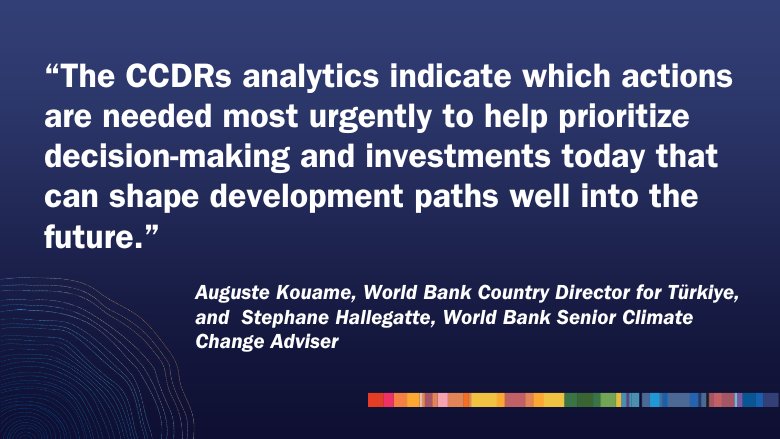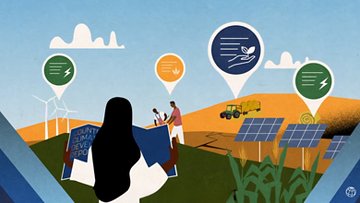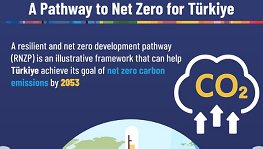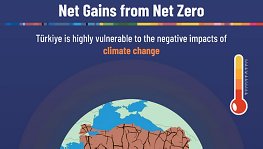Challenge
The GG PASA-CCDR package has supported Türkiye in path-breaking green efforts to address climate change and pivot towards a greener economy. This support was urgently needed: Türkiye is the world’s 17th largest carbon emitter and one of the most vulnerable countries in the region to climate impacts. While the country’s emissions per capita and per unit of GDP remain below the OECD average, total emissions increased sharply over the past decade. Since 2021,
Türkiye has been increasingly placing decarbonization at the core of its strategy for growth and competitiveness—to build upon the opportunities arising from the EU Green Deal and similar trends globally.
At the same time, Türkiye is highly vulnerable to the impacts of climate change and other environmental hazards. 2021 was particularly devastating: floods caused by extraordinary rainfall killed over 80 people and destroyed hundreds of homes and key infrastructure, while forest fires—Türkiye’s worst ever—scorched coastal forestland eight times the size of average annual fires. Under current trends, Türkiye is expected to become a water scarce country by 2030.
In October 2021, with advice from multiple partners including the World Bank, the Government of Türkiye ratified the Paris Agreement, pledged to achieve net zero carbon emissions by 2053, and signed a multi-partner, $3.2 billion Memorandum of Understanding (MoU) for enhanced climate action. These ambitious objectives represent a significant departure from previous trends and call for important policy changes.
The country has decided to pivot away from a business-as-usual pathway with increasing climate vulnerability and reduced efficiencies in energy, transport, and other key sectors; and to undertake a resilient, net-zero transition to deliver economic, social, and environmental benefits, specifically protecting people from climate impacts (adaptation and resilience) and increasing competitiveness in a greener global economy (decarbonization).
Approach
In developing the Türkiye GG-PASA and CCDR the team adopted several effective approaches to maximize the quality of analytics, client ownership, and policy impact. These approaches served as a model for the World Bank's other CCDRs and included building a whole-of-World Bank Group partnership, strong capacity-building with the client, engagement at multiple levels of government including the President’s Office, and embedding the work in World Bank operations. GG-PASA underpinned these efforts and further synergized the World Bank and partner efforts.
Whole-of-World Bank Group partnership: The GG PASA-CCDR used a World Bank Group-wide approach for developing climate engagement with the client, bringing together all global knowledge and expertise from across the global practices and practice groups, IFC and MIGA. Following the publication of the CCDR report in June 2022, the GG PASA continues to support policy dialogue and follow-on analytics on new areas of interest for the Government of Türkiye including for example the social and jobs implications of climate policies (“Just Transition”) and circular economy. These issues are cross-cutting and require participation of World Bank teams across the Global Practice Groups. The GG PASA and CCDR are also informing a series of new IBRD operations under the climate MoU spanning across the World Bank’s four Global Practice Groups and IFC.
Strong capacity-building with client at highest level: Under the GG PASA-CCDR, the World Bank’s approach has leveraged a partnership with multiple Türkiye counterparts at the highest policy making levels. The World Bank has engaged with multiple ministries simultaneously, including Finance, Trade, Industry and closely collaborated with Türkiye’s presidential administration through the Strategy and Budget Office (SBO). Over FY21-FY23, the GG PASA team has undertaken the Low-Carbon Development Partnership with SBO to inform Türkiye’s 12th National Development Plan (2023-2028) and commitment to a Net Zero Pathway by 2053. This collaboration represents an unprecedented level of policymaker commitment and supports Türkiye’s presidential-level development planning in incorporating more climate and green growth-focused approaches than ever before.
Key Highlights from the CCDR
|
Results
The Green PASA-CCDR package contributed to the following:
- It informed the World Bank's strategic engagement through the Systematic Country Development (SCD) and Country Partnership Framework (CPF), and a series of follow-on operations focused on green transition under the climate MoU announced in October 2021.
- It extended or generated a set of related outputs, especially under the GG-PASA, all of which applied and deepened the CCDR’s impact; and provided research and support through “Just-In-Time Policy Note” series.
- It contributed to a strong partnership with Türkiye’s government on the climate and green transition agenda, including an ongoing partnership with the central planning agency, the Strategy and Budget Office, on long-term decarbonization of the economy as well as relationships with the Ministry of Environment on promoting private sector investment in adaptation.
- Support of MoU: In October 2021, a MoU was signed among Türkiye, the World Bank, IFC, and other development partners. The MoU aims to provide $3.2 billion in additional financing and technical assistance and will help mobilize private-sector financing in support of projects aligned with the country's pledge to carbon neutrality by 2053. Under the terms of the MoU, the World Bank will provide $2 billion in climate financing to Türkiye through FY24. This would be on top of the World Bank’s base lending of about $1.5 billion per year. The GG PASA-CCDR supports Türkiye’s work under the MoU by helping to identify key areas needing reform, solutions to adopt and the size of investments needed to address climate change. It is also informing the country’s 12th National Development Plan for 2024-2028, thereby contributing to longer-term benefits.
- The GG PASA-CCDR is driving a wealth of related outputs, including six thematic papers focused on: green finance, climate adaptation and disaster resilience; low-carbon pathways (in partnership with the SBO); social and jobs dimension of green transition (in partnership with the SBO); enabling private investment for adaptation; circular economy; and environmental fiscal reforms. This package of reports informs policy development by helping to identify gaps, assess solutions and propose approaches for implementation.
Bank Group Contribution
The GG PASA-CCDR package is funded by the World Bank and the following Trust Fund Resources:
- Green Recovery Project Design and Implementation Support Grant
- Climate Change Adaptation and Disaster Resilience in Turkey
- NDC-SF Jit Grant
- CREST - Turkey Climate Adaptation Pilot
- Turkey CIF TAF Long Term Low Carbon Options Grant
- CIC Turkey Strengthening Natural Capital Accounting and Environmental Fiscal Reforms
Partners
Partners: France, Germany, UN, IFC, EBRD
Türkiye beneficiaries: Strategy and Budget Office, Ministry of Treasury and Finance, Ministry of Trade, Ministry of Environment, Urbanization and Climate Change
Looking Ahead
The World Bank’s teams will continue to provide critical green growth analytics and capacity building for the formulation of Türkiye’s 12th National Development Plan 2023-2028, Long Term Strategy towards 2053 Net Zero, new Climate Law, and similar policy instruments. It will also support dissemination of existing reports, engage more directly with the private sector, and aim to stimulate a multi-stakeholder debate on the country’s green transition. This collaboration will keep positioning climate and the green transition at the core of Türkiye’s policy planning and growth strategy. The National Development Plan will serve as a signature policy framework by which the bulk of Türkiye’s development policies will be planned and executed.
SCD and CPF—the World Bank’s strategic country engagement document—will guide and support progress in Türkiye’s green growth efforts. The SCD and CPF are planned to be finalized in FY24 and will cover FY2024-2026.
The CCDR is being followed by a Country Private Sector Diagnostic (CPSD) which identifies constraints and opportunities for private sector investments including sectors contributing to climate change mitigation, adaptation, and resilience.
Learn More
Türkiye - Country Climate and Development Report
Key Highlights: Country Climate and Development Report for Türkiye
Climate change adaptation diagnostic tool helps prioritize action, 12 November, 2022.
Blog: A $146 billion windfall for Türkiye while charting a path to a greener and more prosperous future
Op-Ed: Türkiye must act on climate for a resilient and prosperous future
Multimedia
A Resilient and Net Zero Pathway for Türkiye
How Can Countries Navigate Climate and Development Challenges?
Infographics
A Pathway to Net Zero for Türkiye
Net Gains from Net Zero for Türkiye




